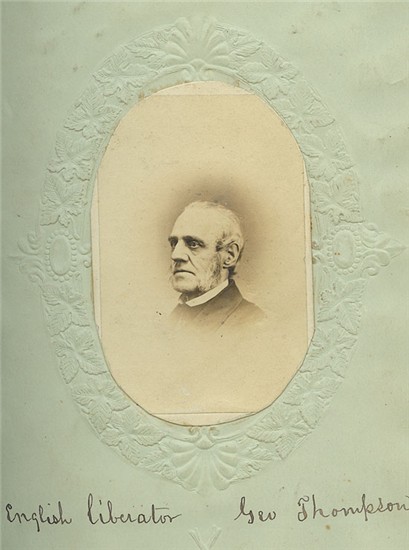Quaker abolitionist Jacob Heaton was an important figure in the American anti-slavery movement. He lived in Salem, Ohio, and his home served both as a stop on the Underground Railway and as a meeting-place for fellow abolitionists and reformers. As Susan B. Anthony, Salmon P. Chase, Elizabeth Cady Stanton, George Thompson, and others passed through his "Quaker Tavern," Heaton invited them to sign his "Record of Friends" -- a scrapbook that he compiled and which contains over 100 entries, letters, poems, photographs, engravings, clippings and ephemera related primarily to the American abolitionist movement.

An entry by Horace Mann
The first entry in the scrapbook, shown here, is signed by Horace Mann. He quotes the King James version of Matthew XXV:45, and adds "Take heed, oh Earth! thus saith the Eternal Word; Whoe'er is false to Man is false to God." Many entries incorporate an inspirational quotation, whether a biblical verse like Mann's above, or a fragment from a secular work. For instance, one entry by Salmon P. Chase (who was later chief justice of the U.S. Supreme Court) records three lines from Racine's Athalie, and abolitionist George Washington Julian quotes from Thomas Paine's The Liberty Tree and Lord Byron'sThe Giaour.
false to Man is false to God." Many entries incorporate an inspirational quotation, whether a biblical verse like Mann's above, or a fragment from a secular work. For instance, one entry by Salmon P. Chase (who was later chief justice of the U.S. Supreme Court) records three lines from Racine's Athalie, and abolitionist George Washington Julian quotes from Thomas Paine's The Liberty Tree and Lord Byron'sThe Giaour.

English abolitionist George Thompson (1804-1878)
George Thompson, a leader in the English antislavery movement, titles his entry "Then and Now." This page-long entry, dated December 8, 1864, recalls that "In the year 1834, for the proclamation of anti-slavery principles, I was reviled, mobbed, persecuted and outlawed; and finally driven from the shores of the United States." He goes on to compare this to the current year, during which he was invited to the Capitol, welcomed "as the guest of the people" and personally thanked by President Lincoln for his work.

An entry by J. B. Strawn
Some entries, especially those dated after the conclusion of the Civil War, concern other reform movements, such as women's suffrage and temperance. Entries by Elizabeth Cady Stanton and Susan B. Anthony, for instance, refer to the 14th and 15th Amendments and demand from Congress "a Declaratory act securing to my sex "the right of suffrage."" This, of course, did not come about until 1920 -- over a decade after the two women had died -- but their struggle is recorded here, in Heaton's "Record of Friends." The scrapbook documents over 45 years of reform movements, and the sentiments that fill it are perhaps best summed up in the entry by a certain J. B. Strawn, who declares "We live not for ourselves. Our object should be to so live, that the world shall be the better, for our having lived."
For more information about the Jacob Heaton "Record of Friends," click here.
The Leon Levy Foundation is generously underwriting a major project to upgrade catalog records for the Morgan's collection of literary and historical manuscripts. The project is the most substantive effort to date to improve primary research information on a portion of this large and highly important collection.
